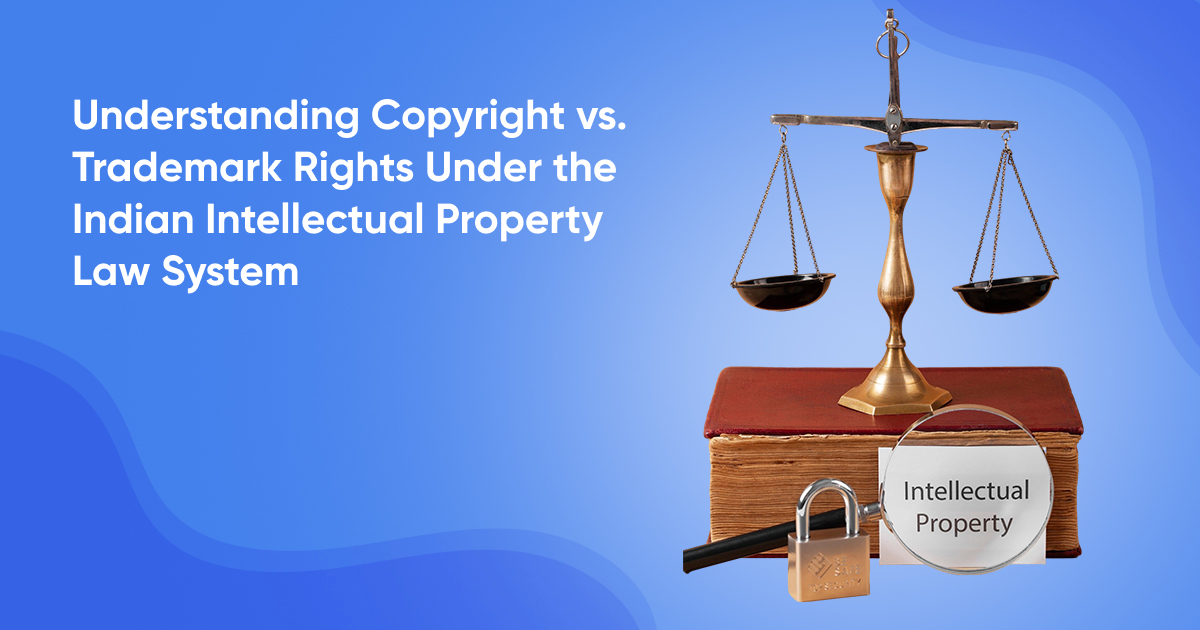Have you ever thought of what protects your creativity? Many say it’s Trademark law. Then what is Copyright? Are they both the same? Absolutely no, copyright laws are different from trademark laws. In India, these two rights play a key role in safeguarding what people build. However, these two have different functionalities. To put it simply, Trademark laws protect brand names, designs, logos, sounds, etc. Whereas, Copyright laws protect your creativity and product. Every small business owner must know how these two work to face future disputes, if any arise.
What Is Copyright? Key Features of Copyright in India
Copyright is a protection for original creative expressions under the Copyright Act of 1957. It applies to content like books, music, films, art, and even software code. The moment you create something original and fix it in a physical or digital form, copyright exists. No registration is needed, although registering your work helps in legal disputes. If you’ve written a blog, designed a poster, or composed a song, copyright automatically protects it. You can stop others from copying or using your work without permission. Copyright lasts for the lifetime of the creator, plus 60 years after death. That makes it a long-term shield for your creative work.
What Is a Trademark? Key Features of Trademarks in India
On the other hand, the Trademark Act 1999 protects anything that helps identify your brand in the market. It includes names, logos, slogans, sounds, packaging, and even certain colors. If you’ve built a brand identity, you need to register it as a trademark. Without registration, your rights may be harder to enforce. You can start using the ™ symbol even if the application is pending. Once it’s approved, you can use the ® symbol. A registered trademark helps stop others from using similar names or logos that can confuse the customers. Unlike copyright, trademark protection lasts 10 years at a time but can be renewed.
Copyright vs. Trademark Comparison
Copyright
- Protects original creative content.
- Governed by the Copyright Act, 1957.
- Applies to works like books, music, art, and software.
- Protection lasts for the life of the creator plus 60 years.
- Registration is optional but recommended for legal enforcement.
Trademark
- Protects brand identity, including logos, slogans, and brand names.
- Governed by the Trademark Act, 1999.
- Applies to symbols that distinguish goods or services.
- Valid for 10 years and can be renewed indefinitely.
- Registration is mandatory for full legal protection and enforcement.
Tata Sons Ltd. v. Greenpeace International (2011)
A real case that highlights the clash between these two rights happened in 2011. The case involved Tata Sons Ltd. and Greenpeace International. Tata filed a case against Greenpeace for using a parody of the Tata logo in a game. The game was part of a campaign protesting Tata’s port project, which could harm turtle habitats.
Tata claimed the use of their logo without permission was both copyright and trademark infringement. They argued that it affected the reputation of their brand. Greenpeace defended the game as a form of satire and public interest expression. They said it was free speech and not an attempt to copy or profit from Tata’s identity.
The Delhi High Court sided with Greenpeace. It ruled that parody and satire are protected forms of expression. The court stated that there was no likelihood that people would confuse Greenpeace’s game with something belonging to Tata. This case showed that trademark rights have limits, especially when they come up against freedom of speech.
For creators and businesses, this case teaches two important lessons. First, always register brand symbols if full legal protection in needed. Second, know that not every use of a brand by someone else is a violation. Context matters.
Importance of Knowing Copyright and Trademark Laws in India
Understanding the difference between copyright and trademark helps entrepreneurs avoid mistakes. Many business owners assume that having a logo or brand name is enough. But without registration, they may not be able to stop someone from copying it. Likewise, creative professionals may skip copyright registration. But in court, a registered work can make it easier to prove ownership.
Here’s how you can protect your work and brand better:
- Register your trademark as soon as possible.
- Keep all your creative work well-documented.
- Avoid using other brands' logos, music, or slogans.
- Consult legal experts for filing and disputes.
Build Smart, Protect Smarter With Trademarkia
In today’s digital world, brand identity and creative content are valuable assets. They deserve more than just creativity; they need the right legal shield. Copyright and trademark rights serve distinct purposes, but together, they offer strong protection for any business or original work.
Awareness is the first step. Taking action based on that knowledge is what truly secures ideas and brand value. If you are unsure where to begin, Trademarkia India provides a clear path forward. From trademark registration to content protection, our expert legal support ensures smart, secure growth. Whether you are growing a startup or an independent creator, Trademarkia India stands ready to guide you each step with confidence.

